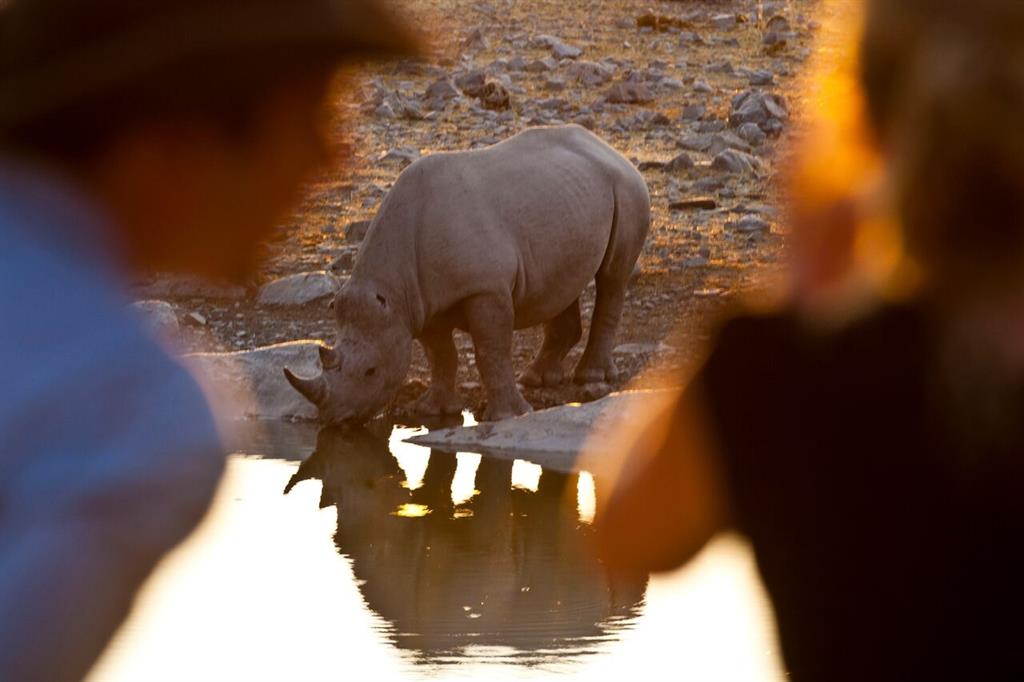United against rhino poaching
The conservation of the rhinoceros is under the spotlight this week.
African countries are joining forces to fight against rhino poachers and come up with new and workable strategies to curb poaching.
Environment deputy minister Bernadette Jagger said this at the 13th meeting of the International Union for Conservation of Nature (IUCN) African Rhino Specialist Group that is being hosted in Namibia. The weeklong meeting was opened yesterday at the Gross Barmen Resort near Okahandja. The meeting was attended by representatives from Zimbabwe, Zambia, Botswana, Kenya, South Africa, Eswatini, Malawi, Tanzania, Luanda, Mozambique and Namibia.
According to Jagger, unprecedented levels of rhino poaching are being experienced across Africa and this threatens the existence of rhino in the wild. According to her the increasing involvement of criminal syndicates in poaching and wildlife trafficking promotes corruption, threatens species, strengthens illicit trade routes and destabilises economies and communities that depend on wildlife. “This situation demands our full attention and collective efforts to develop new strategies and implement current strategies and measures to turn the tide.” Jagger said Namibia has been hard hit by rhino poaching since 2012. The country experienced its worst year of poaching in 2015, when 97 rhino were killed by poachers.
Since then the country has lost an average of 50 rhino annually to poaching, said Jagger.
The slowdown since 2015 was mainly attributed to the combined security efforts of the Namibian Defence Force, the Namibian police, private rhino owners and the environment ministry. “The government and rhino owners continuously have to innovate and collaborate to keep poaching levels down.” She said despite the onslaught of poaching both the white and black rhino populations in Namibia have persevered and continue to grow.
According to her the national black rhino population currently exceeds
2 000 animals and the national white rhino population exceeds 1 000 animals. “This must be our goal as rhino conservationists, to continue to grow rhino populations in the wild. This cannot be achieved if we work in isolation. We need to work together across borders, institutions and organisations,” Jagger said.
Dr Mike Knight, the chairman of the IUCN African Rhino Specialist Group, said Namibia has some of the best conservation legislation in the world.
ELLANIE SMIT
Environment deputy minister Bernadette Jagger said this at the 13th meeting of the International Union for Conservation of Nature (IUCN) African Rhino Specialist Group that is being hosted in Namibia. The weeklong meeting was opened yesterday at the Gross Barmen Resort near Okahandja. The meeting was attended by representatives from Zimbabwe, Zambia, Botswana, Kenya, South Africa, Eswatini, Malawi, Tanzania, Luanda, Mozambique and Namibia.
According to Jagger, unprecedented levels of rhino poaching are being experienced across Africa and this threatens the existence of rhino in the wild. According to her the increasing involvement of criminal syndicates in poaching and wildlife trafficking promotes corruption, threatens species, strengthens illicit trade routes and destabilises economies and communities that depend on wildlife. “This situation demands our full attention and collective efforts to develop new strategies and implement current strategies and measures to turn the tide.” Jagger said Namibia has been hard hit by rhino poaching since 2012. The country experienced its worst year of poaching in 2015, when 97 rhino were killed by poachers.
Since then the country has lost an average of 50 rhino annually to poaching, said Jagger.
The slowdown since 2015 was mainly attributed to the combined security efforts of the Namibian Defence Force, the Namibian police, private rhino owners and the environment ministry. “The government and rhino owners continuously have to innovate and collaborate to keep poaching levels down.” She said despite the onslaught of poaching both the white and black rhino populations in Namibia have persevered and continue to grow.
According to her the national black rhino population currently exceeds
2 000 animals and the national white rhino population exceeds 1 000 animals. “This must be our goal as rhino conservationists, to continue to grow rhino populations in the wild. This cannot be achieved if we work in isolation. We need to work together across borders, institutions and organisations,” Jagger said.
Dr Mike Knight, the chairman of the IUCN African Rhino Specialist Group, said Namibia has some of the best conservation legislation in the world.
ELLANIE SMIT




Comments
Namibian Sun
No comments have been left on this article